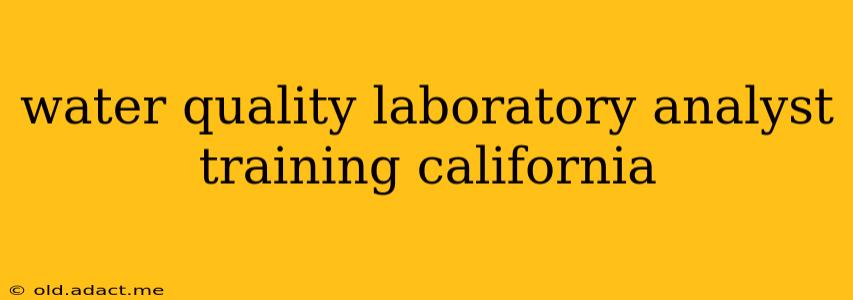California's robust environmental regulations demand highly skilled water quality laboratory analysts. This comprehensive guide explores the training pathways, certifications, and career prospects for aspiring water quality professionals in the Golden State. Whether you're a recent graduate, a career changer, or seeking professional development, understanding the landscape of water quality laboratory analyst training in California is crucial.
What Does a Water Quality Laboratory Analyst Do?
Water quality laboratory analysts play a vital role in protecting public health and the environment. They perform a wide range of tests on water samples from various sources, including drinking water, wastewater, surface water, and groundwater. Their work involves:
- Collecting and preparing water samples: This includes proper handling and preservation techniques to ensure accurate results.
- Performing chemical and microbiological analyses: Using sophisticated laboratory equipment and techniques to analyze water for various contaminants like bacteria, heavy metals, pesticides, and nutrients.
- Interpreting results and generating reports: Analyzing data, identifying potential sources of contamination, and communicating findings to clients and regulatory agencies.
- Maintaining laboratory equipment and ensuring quality control: Calibrating instruments, following strict quality assurance protocols, and maintaining accurate records.
What Types of Training are Available in California?
Several pathways lead to becoming a water quality laboratory analyst in California. These include:
-
Associate's and Bachelor's Degrees: Many community colleges and universities in California offer associate's and bachelor's degrees in environmental science, biology, chemistry, or related fields. These programs often include coursework in water chemistry, microbiology, and laboratory techniques. Look for programs accredited by organizations like the American Public Health Association (APHA).
-
Certificates and Professional Development Programs: Several institutions offer specialized certificates and short courses focusing on water quality analysis. These programs can be valuable for individuals already possessing a relevant scientific background, seeking to enhance their skillset or prepare for certification exams.
-
On-the-Job Training: Some laboratories provide on-the-job training, allowing individuals to learn practical laboratory techniques under the supervision of experienced analysts. This is often combined with formal education or certification.
How Can I Get Certified as a Water Quality Analyst in California?
While there isn't a single, state-mandated certification for water quality laboratory analysts in California, several certifications enhance credibility and demonstrate competency:
-
American Public Health Association (APHA) certifications: APHA offers various certifications, including those related to water quality testing, which are widely recognized within the industry.
-
National Environmental Health Association (NEHA) certifications: NEHA also offers certifications that can be valuable for professionals in the environmental health sector, which often overlaps with water quality analysis.
-
Manufacturer-specific certifications: Some equipment manufacturers offer certifications for operating and maintaining their specific instruments, which can be beneficial in demonstrating expertise in using particular analytical technologies.
What are the Career Prospects for Water Quality Laboratory Analysts in California?
California's commitment to environmental protection fuels high demand for qualified water quality laboratory analysts. Job opportunities exist in:
-
Environmental consulting firms: These firms often contract with municipalities, industries, and government agencies to perform water quality testing and analysis.
-
Government agencies: State and local agencies, such as the California Water Resources Control Board and regional water quality control boards, employ numerous water quality professionals.
-
Private water utilities: Water companies responsible for providing safe drinking water employ analysts to ensure compliance with regulations.
-
Industrial facilities: Many industries, particularly those with wastewater discharge permits, employ their own water quality analysts to monitor and manage wastewater treatment.
What are the Necessary Skills for a Water Quality Laboratory Analyst?
Beyond formal training, successful water quality laboratory analysts possess several essential skills:
- Strong analytical skills: Ability to interpret complex data and draw accurate conclusions.
- Attention to detail: Maintaining accuracy in laboratory procedures is crucial.
- Familiarity with laboratory equipment and techniques: Proficiency in operating various instruments and performing a range of tests.
- Excellent record-keeping skills: Maintaining detailed records and reports is vital for compliance and data integrity.
- Problem-solving skills: Ability to troubleshoot issues, identify the source of errors, and implement corrective actions.
How Much Does a Water Quality Laboratory Analyst Make in California?
Salaries for water quality laboratory analysts in California vary depending on experience, education, and location. Entry-level positions typically offer a competitive salary, with opportunities for advancement and salary increases with experience and certification.
Where Can I Find Water Quality Laboratory Analyst Jobs in California?
Numerous job boards and websites specialize in environmental science and water quality positions. Online job postings frequently appear on sites like Indeed, LinkedIn, and government job portals. Networking within the industry through professional organizations like APHA and NEHA can also lead to valuable career connections.
This guide provides a comprehensive overview of water quality laboratory analyst training and career prospects in California. Remember to research specific programs and certifications that align with your career goals and ambitions within this vital field.
